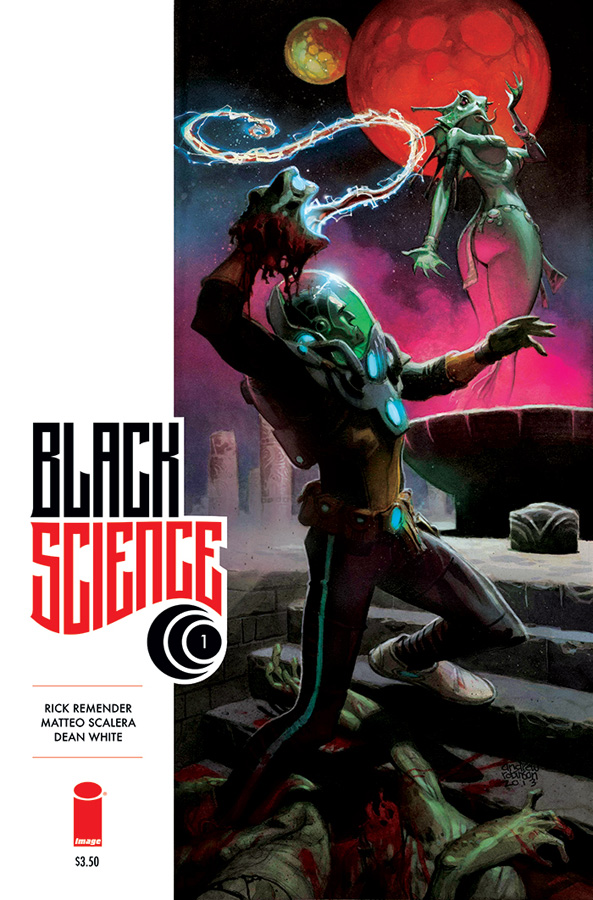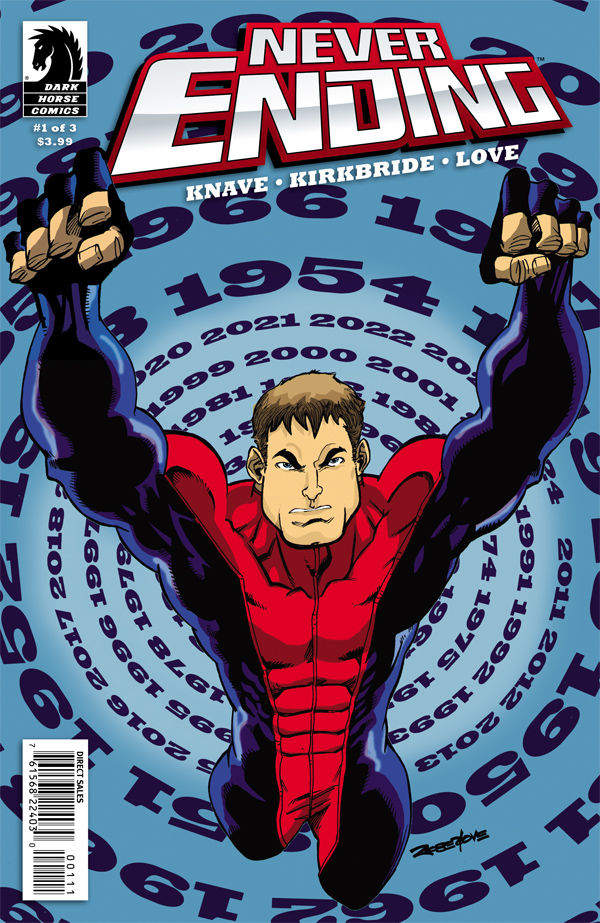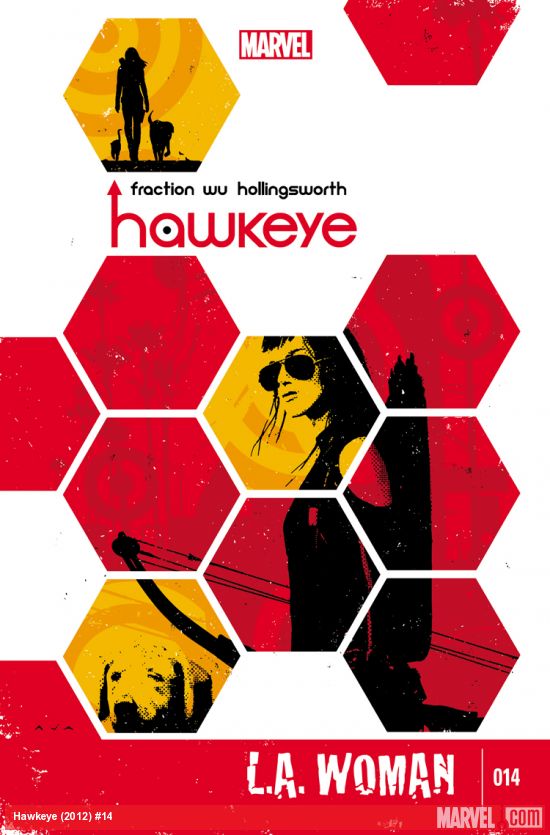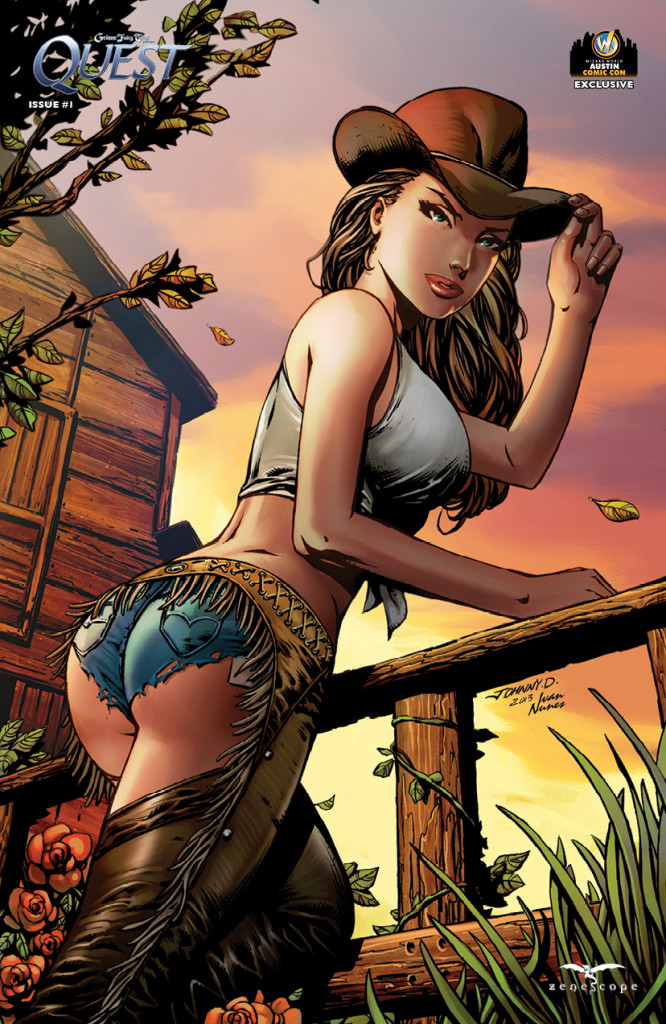We’re No. 1! is a weekly feature looking at first issues in new comic series, as well as one-offs and special releases. In his reviews, Jeff highlights stories with diverse characters and plot lines Geekquality readers can care about, as well as points out comics that miss the mark.
 There are three lovely morsels this week, beginning with the much anticipated Black Science #1 from Rick Remender and Matt Scalera. This is a wildly imaginative tale of a group of ”Dimensionauts” led by scientist Grant McCay of the Anarchistic Order of Scientists. (The titles just blow me away!) They are wandering lost through the infinite realities of the Eververse, as Grant delves into the forbidden realms of “Black Science”, exploring fringe disciplines of study that others wouldn’t dare to touch. Grant is wrought with guilt in having involved his team and his family in such horrific pursuits, struggling to help them escape a land of angry frog men who enslave and exploit the fish-man race of their unusual black skied world. However, McCay consistently defends (in running inner monologue) the right of visionary men to tread where others tell them they should not. Remender (the creator of Blackheart Billy) lets his anti-establishment sensibilities shine in this unbridled fantasy. McCay is both a distraught father and leader, and an angry rebel in one breath. These realms that he and his team discover aren’t the “like ours but slightly skewed” alternate dimensions usually seen in sci-fi, but off the charts imagination run amok. Still, McCay remains very human, displaying a strong sense of family and decency. In particular, his rescue of an enslaved fish-lady who’s being harassed and tormented by the frog men because she’s “someone’s daughter too” is particularly telling of McCay’s depth of personal feeling, and makes Black Science both high concept sci-fi and great family adventure storytelling.
There are three lovely morsels this week, beginning with the much anticipated Black Science #1 from Rick Remender and Matt Scalera. This is a wildly imaginative tale of a group of ”Dimensionauts” led by scientist Grant McCay of the Anarchistic Order of Scientists. (The titles just blow me away!) They are wandering lost through the infinite realities of the Eververse, as Grant delves into the forbidden realms of “Black Science”, exploring fringe disciplines of study that others wouldn’t dare to touch. Grant is wrought with guilt in having involved his team and his family in such horrific pursuits, struggling to help them escape a land of angry frog men who enslave and exploit the fish-man race of their unusual black skied world. However, McCay consistently defends (in running inner monologue) the right of visionary men to tread where others tell them they should not. Remender (the creator of Blackheart Billy) lets his anti-establishment sensibilities shine in this unbridled fantasy. McCay is both a distraught father and leader, and an angry rebel in one breath. These realms that he and his team discover aren’t the “like ours but slightly skewed” alternate dimensions usually seen in sci-fi, but off the charts imagination run amok. Still, McCay remains very human, displaying a strong sense of family and decency. In particular, his rescue of an enslaved fish-lady who’s being harassed and tormented by the frog men because she’s “someone’s daughter too” is particularly telling of McCay’s depth of personal feeling, and makes Black Science both high concept sci-fi and great family adventure storytelling.
 The creators of the fantastic Amelia Cole series return with an all new book from Dark Horse Comics. Never Ending #1 by Adam P. Knave and D.J. Kirkbride, is the story of Charles Baxter, a normal young man who becomes the ultimate superhero. When a meteor endows Chuck with nearly limitless super powers, he strives to help his fellow man while being constantly opposed by the evil genius Archibald Crane. But Chuck’s limitless strength, flight and invulnerability come with a terrible price: immortality. Chuck Baxter has lost the love his life, not to terrible conflict or a nefarious enemy, but to time itself. When he was made super back in 1950, Chuck had fallen in love with an African American woman named Ellie. At that time, Chuck says, Ellie’s father wasn’t the only person who objected to their marriage. Indeed, at one point Chuck viewed his ageless life as blessing, telling us that “One perk of living as long as I have is seeing fewer and fewer people care about such things.” Yet the ravages of time have cost him his wife and son, driving Chuck Baxter to pursue the same goal as the nefarious Archibald Crane: find a way to kill Chuck Baxter! What at first seems like a fairly sad but simple capes comic takes on a unique depth in the twist ending, looking at the standard genre figure from a dark new perspective. What if the greatest hero on Earth no longer wanted to be a hero, or even to be at all? The themes of love and loss are ever present in this book, and the traditional Sunday comic artistic style of Robert Love is superbly suited to this imaginative and heartfelt take on the genre.
The creators of the fantastic Amelia Cole series return with an all new book from Dark Horse Comics. Never Ending #1 by Adam P. Knave and D.J. Kirkbride, is the story of Charles Baxter, a normal young man who becomes the ultimate superhero. When a meteor endows Chuck with nearly limitless super powers, he strives to help his fellow man while being constantly opposed by the evil genius Archibald Crane. But Chuck’s limitless strength, flight and invulnerability come with a terrible price: immortality. Chuck Baxter has lost the love his life, not to terrible conflict or a nefarious enemy, but to time itself. When he was made super back in 1950, Chuck had fallen in love with an African American woman named Ellie. At that time, Chuck says, Ellie’s father wasn’t the only person who objected to their marriage. Indeed, at one point Chuck viewed his ageless life as blessing, telling us that “One perk of living as long as I have is seeing fewer and fewer people care about such things.” Yet the ravages of time have cost him his wife and son, driving Chuck Baxter to pursue the same goal as the nefarious Archibald Crane: find a way to kill Chuck Baxter! What at first seems like a fairly sad but simple capes comic takes on a unique depth in the twist ending, looking at the standard genre figure from a dark new perspective. What if the greatest hero on Earth no longer wanted to be a hero, or even to be at all? The themes of love and loss are ever present in this book, and the traditional Sunday comic artistic style of Robert Love is superbly suited to this imaginative and heartfelt take on the genre.
 Lastly our honorable mention this week goes to Matt Fraction and Annie Wu’s Hawkeye #14. Wu handles artistic duties for the title when the story focuses on Kate Bishop, our favorite Hawkeye. Kate packed up and headed to L.A. in the Hawkeye Annual, and is making a life for herself, which she finds is more difficult than she thought at first. After all, not every superhero is a wealthy billionaire playboy, as this title constantly reminds us, and young Kate heads out to find a regular job to pay the bills. She offers her super heroic services online, and eventually to her neighbors. One pair of her neighbors, a gay couple on the eve of their wedding, have lost their ideal rare orchid when their florist’s shop was robbed and burned. Kate is quickly on the case, doing everything she can to help save their special day and establish herself as a private eye and local super hero in the process. The story initially focuses on Kate and the everyday struggles of a young woman who is (in the same fashion as her mentor Clint Barton) a person first and super hero second. In contrast to Clint’s loveable slacker routine, Kate is bright and enthusiastic, full of positive energy. In a genre where most creators want to pursue a “new, grittier take” on every comic character under the sun, Kate is an optimist and most of all, happily young. Her youthful charm and the touching scene between two men so desperate to marry each other they’ll take any wedding they can get, even if only with the one flower Kate is able to save, make this book a breath of fresh air as well as a wonderful statement on diversity and true love. Fraction once again knocks this title out of the park, and Annie Wu’s more distinct artistic style give Kate an extra depth of character that make her issues as compelling, if not more so, than Clint’s, and insure that both chapters of this title are worth catching every single month.
Lastly our honorable mention this week goes to Matt Fraction and Annie Wu’s Hawkeye #14. Wu handles artistic duties for the title when the story focuses on Kate Bishop, our favorite Hawkeye. Kate packed up and headed to L.A. in the Hawkeye Annual, and is making a life for herself, which she finds is more difficult than she thought at first. After all, not every superhero is a wealthy billionaire playboy, as this title constantly reminds us, and young Kate heads out to find a regular job to pay the bills. She offers her super heroic services online, and eventually to her neighbors. One pair of her neighbors, a gay couple on the eve of their wedding, have lost their ideal rare orchid when their florist’s shop was robbed and burned. Kate is quickly on the case, doing everything she can to help save their special day and establish herself as a private eye and local super hero in the process. The story initially focuses on Kate and the everyday struggles of a young woman who is (in the same fashion as her mentor Clint Barton) a person first and super hero second. In contrast to Clint’s loveable slacker routine, Kate is bright and enthusiastic, full of positive energy. In a genre where most creators want to pursue a “new, grittier take” on every comic character under the sun, Kate is an optimist and most of all, happily young. Her youthful charm and the touching scene between two men so desperate to marry each other they’ll take any wedding they can get, even if only with the one flower Kate is able to save, make this book a breath of fresh air as well as a wonderful statement on diversity and true love. Fraction once again knocks this title out of the park, and Annie Wu’s more distinct artistic style give Kate an extra depth of character that make her issues as compelling, if not more so, than Clint’s, and insure that both chapters of this title are worth catching every single month.
 Lastly, we must point out the gratuitous exploitation that is Zenescope Comics. Their latest, Grimm Fairy Tales: Quest #1 is a straight forward fantasy adventure about a group of four adventurers seeking to rid their land of a malevolent evil force. The main character is billed as the Princess Aisling, though the story focuses as much on the fallen knight Blake as it does on her. It’s standard fantasy fare, and in typical Zenescope fashion, the heroine is a strong willed woman who speaks her mind freely and holds her own in any battle. Sadly, also in typical Zenescope fashion, don’t show as much respect for women as we’d like with their covers, especially the alternate versions. The cover seen here is a special edition for Austin’s Wizard World Comic Con, and the more rare alternate version is even worse, losing the shorts altogether. The limited run of these “valued” covers reiterate that the issues to be “prized” are the ones depicting Zenescope’s characters as sex objects rather than strong women. Failure once again, Zenescope.
Lastly, we must point out the gratuitous exploitation that is Zenescope Comics. Their latest, Grimm Fairy Tales: Quest #1 is a straight forward fantasy adventure about a group of four adventurers seeking to rid their land of a malevolent evil force. The main character is billed as the Princess Aisling, though the story focuses as much on the fallen knight Blake as it does on her. It’s standard fantasy fare, and in typical Zenescope fashion, the heroine is a strong willed woman who speaks her mind freely and holds her own in any battle. Sadly, also in typical Zenescope fashion, don’t show as much respect for women as we’d like with their covers, especially the alternate versions. The cover seen here is a special edition for Austin’s Wizard World Comic Con, and the more rare alternate version is even worse, losing the shorts altogether. The limited run of these “valued” covers reiterate that the issues to be “prized” are the ones depicting Zenescope’s characters as sex objects rather than strong women. Failure once again, Zenescope.

